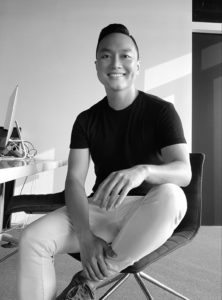We sat down with our Founder’s Executive Assistant Vinh Lemaniak and asked him to reflect on what Refugee Week means to him.
Arriving in Australia as a child whose family fled Vietnam in the early eighties, Vinh told us that he sees Refugee Week as “an important push for empathy and compassion, and an opportunity to reflect on how our attitudes and policies relating to refugees have changed over time.”
As a firm, and as a community, we are deeply enriched by these stories and we are grateful to Vinh for sharing his story with us.
“I think a lack of education and a disconnect around the reasons why people flee their country has seen attitudes toward refugees in Australia change over time, and not necessarily for the better.
When my family arrived from Vietnam we were treated with respect and the process was relatively straight forward. But that changed after the Howard Government in the 1990’s.”
Vinh’s family came to Australia in 1984, after the fall of Saigon. It was a journey that took five years to plan and execute, with several false starts, each one putting their lives at great risk. Vinh’s mother and uncles organised a boat designed for 100 people to carry 600 people across choppy, pirated seas to Indonesia. They first had to accumulate enough food and medicines to survive the journey, as well as negotiating with corrupt local authorities for a safe escape route out of Vietnam. There was no discrimination between wealthy and poor, healthy or frail; the boat carried people from all walks of life. Many were highly educated, qualified and skilled intellectuals and professionals. All were required to leave belongings, families and friends behind.
The harrowing voyage was dangerous. Many boat loads of people attempting to escape Vietnam did not make it. Vinh and his fellow passengers were in constant fear of the boat being hijacked by pirates, which was a very real possibility in the South China Sea at that time. Vinh recalls that a woman even gave birth on the boat during the 7 days it took to reach the refugee camp, on the island of Galang, Indonesia.
Eventually arriving in Adelaide, at the age of 7, after nearly a year in the refugee camp, Vinh found that it was easier for him and his young cousins of similar ages to assimilate than for the adults. “It was about survival. I had to adapt very quickly because children can be cruel. I had to observe and adapt my behaviour to fit in. I think I just tried to become as Australian as possible as quickly as possible. I effectively grew up with two cultural identities. I watched older cousins and the adults in my extended family try to hold on to their traditional customs and identities, and this made it much harder for them. It’s also much easier for children to learn a new language, but for many Vietnamese families, it was considered rude to speak English at home.”
Vinh observed highly qualified professionals including engineers, doctors, dentists, architects, and lawyers suffer under the misconception of being unqualified and uneducated, and because of the language barrier. “I have seen people in my family succeed and I have seen them fail.”
Fortunately, Vinh’s mother grew up speaking French and English, and was able to quickly secure work as an interpreter for the Department of Immigration. She worked hard to provide a new life for her family.
When asked what he feels Australians can do during Refugee Week, Vinh believes the most meaningful thing we can do is to listen to people’s stories, and to seek to understand the circumstances which led them to make the difficult decision to escape their countries, leave everything behind, and putting their lives at risk . “This is where we start to develop the roots to empathy and begin to see the value that refugees bring to our society and our workforces.”
“Being a refugee, working hard in Australia and striving for success, go hand in hand because as a refugee you have been given an opportunity for a better life and you are so grateful. I feel extremely fortunate to have been given the opportunity to grow up in a safe and peaceful country, where I can I build a solid future. I am so happy to be in Australia and proud to be an Australian.”
For those who want to learn more, Vinh recommends reading:
“The Happiest Refugee” by Anh Do https://www.allenandunwin.com/browse/books/general-books/biography-autobiography/The-Happiest-Refugee-Anh-Do-9781742379302,
“Where The Sea Takes Us” by Kim Huynh https://www.harpercollins.com.au/9780732285609/where-the-sea-takes-us/,
In contrast to the welcoming spirit of the Australian government in the 1980s, we have witnessed an unfortunate change in attitude towards refugees and the treatment of asylum seekers in this country, especially over the past two decades. It’s worth reading stories from people such as Behrouz Boochani, a Kurdish-Iranian refugee who was detained on Manus Island for six years and “wrote” an entire book using just his mobile phone.
“No Friend But the Mountains: Writing from Manus Prison” by Behrouz Boochani https://www.panmacmillan.com.au/9781760780852/ provides a present-day account of the refugee experience. The book won the Victorian Prize for Literature in 2019.

